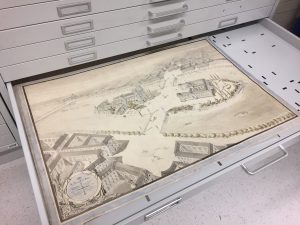Archive cataloguing project intern, Sorina Mihai, relays her first impressions from her busy first two weeks with our ‘Evergreen: Patrick Geddes and the Environment and Equilibrium’ project. With a jam-packed schedule, and jumping right in at the deep-end of core archive work, Sorina is already making a significant and valuable contribution to our project. Read more about her initial experience and learning in this thoughtful and considered blog post.
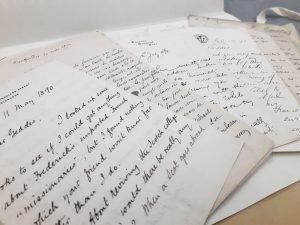
Selection of correspondence from the Patrick Geddes papers (Ref:T-GED12/3)
I was very excited to start my archives cataloguing internship with the ‘Evergreen: Patrick Geddes and the Environment in Equilibrium’ project two weeks ago. I am delighted to be part of a collaborative project between the universities of Edinburgh and Strathclyde which is instrumental in reuniting, preserving and cataloguing the two collections of papers of Scottish polymath Patrick Geddes. My eight-week internship is based predominantly at the Archives and Special Collections at the University of Strathclyde. I will be creating new catalogue descriptions for a discreet series of records within the collection, which pertains to the correspondence related to Patrick Geddes’ educational projects. My contribution will help to enhance the discoverability and usability of the Geddes collection.
I am looking forward to familiarising myself further with professional archive standards and becoming more confident in using them in my daily work. My previous experience as a volunteer with the ‘Evergreen’ project helped me to get acquainted with these standards and professional practices. I feel I am going to benefit considerably through having to use them continuously over a sustained period of time during my internship.
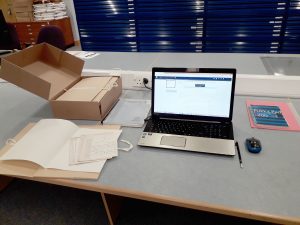
Archive cataloguing project intern work-station at the University of Strathclyde Archives and Special Collections
One of my main objectives is to become aware of and understand the challenges related to archive cataloguing and ways of facilitating access to archive collections. At the beginning of my internship I had the chance to meet with and speak to a range of information and curatorial professionals from both universities. At the University of Edinburgh, I had conversations with Joe Marshall (Head of Special Collections and the Centre for Research Collections), Grant Buttars (Archivist: University Archives and Technical Systems), Louise Williams (Lothian Health Services Archive), Jenny Duffy (Project Archivist), Lorraine McLoughlin (Appraisal Archivist), Fin West (Rare Books), and Emily Hick (Conservation). At the University of Strathclyde I met with Victoria Peters (Head Archivist), Rachael Jones (Assistant Archivist) and Carol Stewart (Special Collections Library Assistant). I also had the opportunity to shadow staff in the archive reading rooms at both institutions. These conversations have allowed me to broaden and deepen my general understanding of the professional field, and I have been able to see how various departments can work together. For example, Lorraine’s new system of appraisal not only helps save precious storage space, but it also greatly facilitates and helps colleagues from other departments keep track of how much stock they have and how much space they still have for new acquisitions. Grant’s efforts for securing funding are paramount for cataloguing, conservation or digitisation projects in order to make valuable collections available to the public both online and on site.
I am particularly interested in developing skills related to collections promotion and advocacy which are areas I have not yet explored. I strongly believe in the value of the Patrick Geddes collections and their importance to national and international cultural heritage. The collections cover most of Geddes’s life, nearly all the places where he lived and worked, and are a testimony of his many fields of activity, such as sociology, education, urban planning, and nature conservation. They also reunite a vast collection of correspondence in various languages from notable scientists, academics, sociologists, artists and writers from across the world. They are an invaluable record of Geddes’ global thinking and many interests, the fervent exchange of ideas across borders and joint efforts for improving education, urban planning and the wellbeing of citizens…just to name a few.
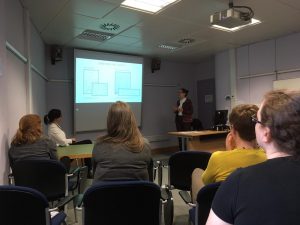
Project intern, Sorina Mihai, helping to promote the Patrick Geddes collections to University of Strathclyde library staff
I realise the ever-increasing importance of promoting collections to patrons and justifying the value of archival services to stakeholders. Archives offer communities the opportunity to learn, explore, interact and can inspire people to become more active in their communities. This is why I would like to develop the ability to engage with different audiences, develop and improve my presentation skills, such as presentation structure and delivery, and body language.
On a personal level, I hope to enhance my decision-making and time management skills, particularly in relation to how to prioritise competing agendas, and successful multi-tasking. I am also looking to gain networking skills which are so valuable in creating and sustaining connections with fellow professionals, enabling innovative and engaging collaborations, projects or initiatives. I would also like to further develop core skills such as work-planning, analysis, interpretation and research.
I feel very fortunate to be working within such an experienced and supportive team. Across the project team and supporting staff I have access to a vast bank of knowledge and professionalism, and their dedication is extremely inspiring and motivating. I very much appreciate the opportunity to learn in such a supportive and knowledgeable environment.
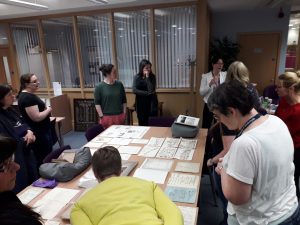
Promoting the Patrick Geddes collections to University of Strathclyde library staff
I have already started on cataloguing, have helped to deliver a training session which was designed to raise awareness of the project, collections and research activity around Patrick Geddes, and learned about reading room procedures at both universities. Helping to deliver the training session, I came to realise that a lot more time and work goes into delivering a presentation than I had anticipated. A lot of thought and work went into designing the content of the presentation for a particular audience and also in selecting the most relevant items to have on display in the reading room. The items had to complement the presentation and be arranged thematically in such a way as to encourage and facilitate curiosity and discovery. This experience also made me realise that the process of physically selecting, retrieving and returning documents for my section of the presentation took a good few hours to complete.
The ‘Evergreen’ internship is a tremendous opportunity for me to start transitioning from libraries to archives, a profession I have developed a great enthusiasm and passion for. I am applying for a postgraduate course in Archives and Records Management this year and this experience will help me to develop a solid practical foundation on which I can build the theoretical knowledge delivered by the postgraduate course. I hope this practical experience, complemented by my academic training in Information and Library Studies and the future study of Archives and Record Management will provide a strong grounding for my future career as an archivist.
Meanwhile, I greatly enjoy discovering the vast network of correspondents that Patrick Geddes was in touch with. I was very pleased to come across correspondence from French Nabis painter Paul Sérusier, Scottish physician and academic Diarmid Nöel Paton, French Prime Minister Georges Benjamin Clemanceau, Belgian lawyer and Nobel Peace Prize winner Henri Marie la Fontaine, English pioneer of women’s higher education Constance Maynard, and French poet and writer Marc-André Raffalovich. Who shall I uncover next?

